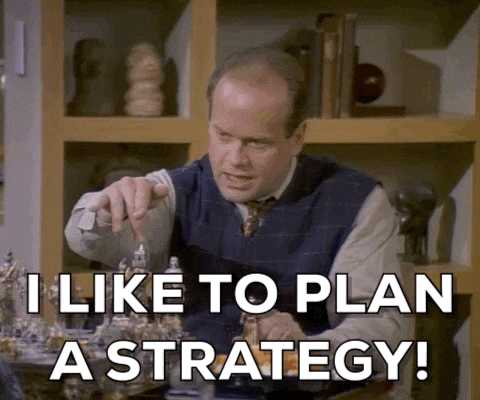Good morning, threes of fans!
It's been kind of a crazy week around here, but somehow, I managed to cobble together some more thoughts about reading. This week, I am proposing some strategies for relearning how to read and get more out of my reading time.
#1: Sir, This Brain is a Library
I think I have made progress toward reclaiming my brain from the Internet. For one thing, getting off social media has brought huge benefits.
But I've realized that my addiction to podcasts has sent me down a path toward being one of those Never Bored people--someone who needs constant inputs. I'm a bit disappointed in myself about this, because I was that irritating mom who told her kids it was good to be bored.
I need to follow my own advice.
One huge step toward better brain health and more creativity is to start backing away from the podcasts and related inputs. They're fine for distracting me while I exercise, but I've gotten used to listening when I clean, cook dinner, drive to Coeur d'Alene, grocery shop, even play with the dogs or knit.
That's too much.
I need more quiet. I need to relearn how to let my brain rest. It's in the rest that recovery happens.
I don't think I'm going to create a hard-and-fast rule for the inputs from podcasts, but I am going to try to ask myself a few questions before I indulge: Do I need this podcast right now? Does this build me up or tear me down? What is the advantage of consuming this noise over letting my brain be quiet? I think allowing my brain more time away from inputs will help me recover some of my brain function.
And if I really need an input, I can always find some classic 80s jams and sing like nobody's listening.
#2: The Timey-Wimey Bit
I started thinking about how I used to read, and I realized--I don't use my interstitial time the way I used to.
Interstitial time refers to all those moments between the bigger chunks of time. I've written before about transition time and how hard it is to move my brain back into work mode when I've had to step out of it and back into it, but this is a little bit different. These are the moments before a meeting or in line at the grocery store or waiting at the dentist's office.
We all used to use our interstitial time better than we probably do now. We read books or magazines while waiting in line, or we struck up conversations with our fellow humans who were trapped in the queue with us. I've seen--and been--someone knitting a few stitches while inching closer to the window somewhere.
Now? Many of us would have to admit that we're scrolling or browsing or posting.
Listen, I used to be the kid who ran into poles because she was reading just a few pages while walking to her next class. The bestie and I read books every day on the bus on the way to school, both of us with knees up on the seat in front of us and books propped up three inches from our faces. Back when I was working full-time in an office, I used to read on my lunch breaks almost every day. I'd often read at my desk while I ate, but even if I left to buy lunch, I'd take my book with me and read in a deli, cafe, restaurant, or even my car.
Sooo... I'm going to try to reclaim my interstitial time, and hopefully maybe claim back part of my brain from my phone and the Internet. At a minimum, I can start reading while I eat lunch instead of scrolling or playing mindless games.
#3: Retreat... RETREAT!
Let me say first of all--I absolutely love my office.
However.
My office is right next to the living room and overlooks our front porch. During the day, this is fine--I can intercept packages, and when I leave the office door open, the four-legged family members can wander in and out at their leisure.
But in the evening, if The Man is watching TV and I want to read, I don't have a great place to retreat to except bed, and then I fall asleep. Plus, when I try to combine work and leisure in one space, it makes both more difficult.
So, I have a strategy for retreat.
Since our youngest moved out, I've been thinking about how to refresh our three bedrooms. Because her old bedroom is the empty one, I'm starting there. It will be sort of a bright, cheery guest room/hobby room, and I think part of that will mean creating a little reading nook--a place where I can go for extra quiet when I want some deep focus in my books.
I'm also going to put all my yarn and craft things in there to make a space where I can knit and crochet and maybe even sew on occasion. And--my daughter didn't have room for her keyboard, so it's in there as well. I might start playing the piano again. Maybe. It's been a very long time, but I think it'll come back to me.
The retreat strategy is part of creative cross-training. I have long said that I believe in creative cross-training. I think that knitting, crocheting, reading, exercising, commercial writing, and probably playing piano all improve my fiction writing. But in order to do that cross-training, I need to retreat from other things.
And that leads me to the final strategy.
#4: Purposeful Reading
With a quieter brain, a bit more time, and a peaceful physical space, I should be able to start improving how I read. I'm lumping the last few tactics into an overall strategy I'm calling "purposeful reading."
First, I'm going to occasionally put my phone in airplane mode when I'm reading. I've been occasionally putting my phone in airplane mode when I need to really focus on work, so why not do that for books? As a writer, books are my work, so I should not feel bad about seeking deep focus when I'm reading. I can always check for messages after an hour or so. The world can live without me for an hour.
Second, I'm going to start a reading notebook. In high school and college, the teacher would assign sections of reading and encourage us to take notes or highlight passages. I used to have a really good memory for what happened in books, so my notes were sketchy at best. The memory is not what it used to be, to say the least--see any number of previous posts mentioning children, Internet, podcasts, hormonal challenges, general aging, and miscellaneous distractions.
I am going to start reading with a notebook next to me so that I can jot down the things I want to remember. There is a fair amount of evidence that writing by hand improves memory, retention, and comprehension--all three of which I need to improve.
Finally, I'm going to start looking up words, phrases, concepts, and history that comes up when I'm reading. The reading notebook should come in handy here--I can jot down things I want to look up and do so when I'm at my computer so that I don't interrupt the reading time.
Are these tactics pretty old school?
Yup.
Am I old school?
I am proudly old school.
It is entirely possible that all of these resolutions are a result of entering the solitude phase of the hermit cycle, but even if that's the case, I may as well use that phase to set myself up for success in the re-entry phase. Or something.
Tell me--are you inspired to read more lately? How are you going to improve your reading habits?
Next week, some books I'm thinking about re-reading...










